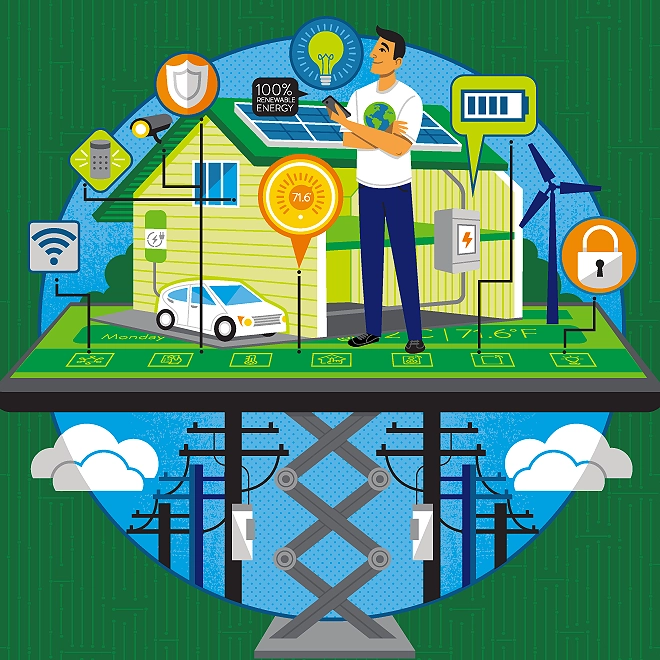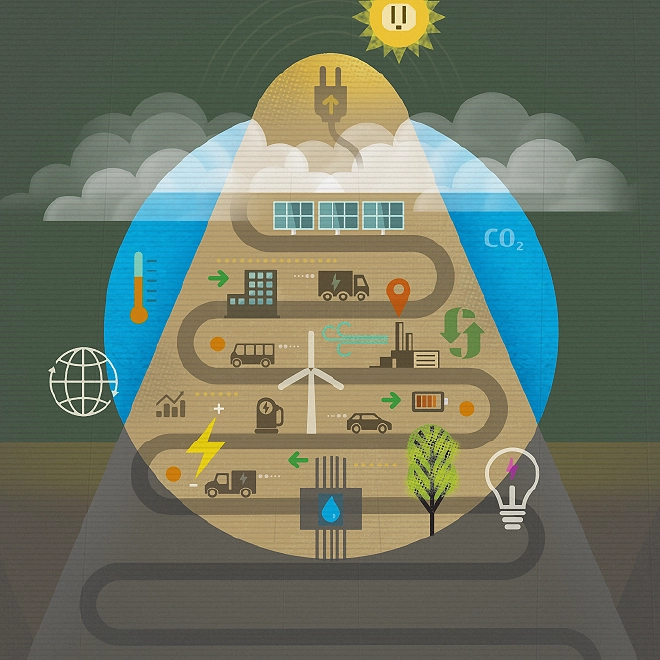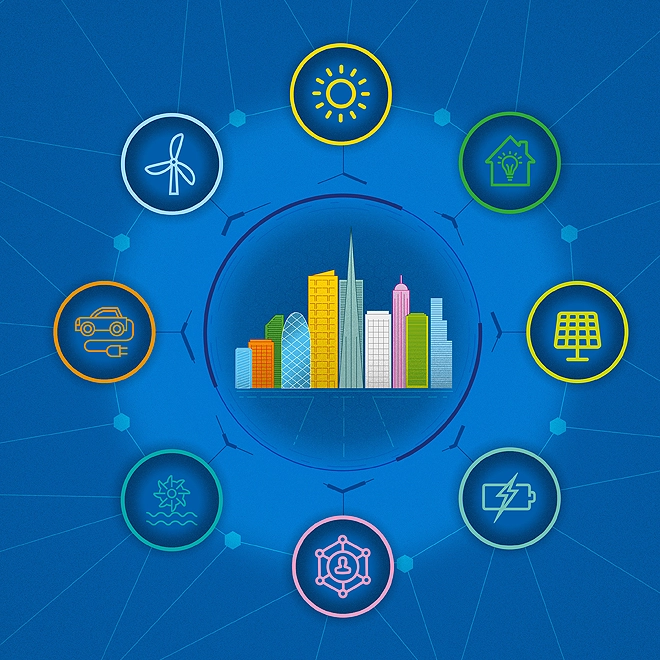Energy management: Paused by pandemic, but poised to prevail
Deloitte Resources 2020 Study
With the COVID-19 pandemic sending the economy into recession, energy and resource use by US businesses and residential consumers are bound to be affected. We look at the Deloitte Resources 2020 Study—as well as historical data over the past nine years—to identify trends that offer a glimpse into the future of energy and resource management.
Introduction
WITH COVID-19 bringing about deep societal changes and sharply contracting economic activity, changes are likely in how US businesses and residential consumers manage their energy and resource use. While the specifics are not clear yet, the results of our Deloitte Resources 2020 Study (hereafter referred to as “the Study”) provide a glimpse into business and residential consumer attitudes toward key energy and climate issues at the onset of the global pandemic and recession.
The good news is that given the trends we’ve seen in Deloitte’s annual resources studies over the past 10 years—culminating with the 2020 survey—it appears likely that despite the current crisis, energy management progress is unlikely to recede too far for too long. While businesses and residential consumers are adjusting to a shock that may distract them from energy management in the short term, programs will likely continue to advance in the intermediate and longer term.
Consider these results from the Study:
- Sixty-eight percent of residential consumers surveyed agree strongly or somewhat with the statement “I’m very concerned about climate change and my personal carbon footprint,” in line with survey results in previous years.
- Nearly six in 10 businesses surveyed feel increased pressure from stakeholders to disclose and address climate risk and, of those, nearly nine in 10 have reviewed or changed their disclosure procedures and developed plans to address climate-related risks.
- Sixty percent of businesses reported having onsite generation, up nearly 40 points compared with 10 years ago, and 44% have considered implementing a microgrid, up 9 points from 2019.
- More than half (53%) of residential consumers surveyed said it’s extremely or very important that part of their electricity supply comes from renewable energy, revisiting a historic high among studies, and 51% of business respondents said they’re working to procure more electricity from renewables, up 4 points from 2019.
- Sixty-five percent of residential consumers surveyed saw greater renewable energy development boosting the national economy, the highest level since the 2014 Study.
- Fifty-two percent of business respondents are concerned about an interruption to their electricity supply due to a cybersecurity event on the electric grid and 37% of residential consumer respondents share this concern.
- More than three-quarters (76%) of residential respondents said they’re more concerned about privacy and security as homes get more automated, a 15-point jump from the 2019 Study. And 46% said that concern could prevent them from buying smart home technologies.
To gain further perspective, we explore seven trends from the Study, split into three sections, which we call the Reinforcers, the Bellwethers, and the Hurdles.
The Reinforcers: Three key trends that support continued energy management progress
We identified three Reinforcers in the Study: rising consumer sentiment and stakeholder pressure on businesses to address climate change, the convergence of environmental and cost drivers, and the quest for greater resiliency and self-sufficiency.
Consumer sentiment and stakeholder pressure to address climate change are increasing. Businesses and consumers hard-hit by the COVID-19 pandemic and recession may be moving climate change action to the back burner in the short term as they struggle to survive and thrive in a fast-changing global landscape. But strong consumer sentiment (figure 1) and increasing stakeholder pressure on businesses prior to the crisis, as well as evidence of continuing stakeholder concern and superior performance of environmental, social and governance (ESG)–minded companies,1 may indicate that environmental initiatives and programs will likely continue in the longer term.

Environmental and cost considerations increasingly go hand-in-hand. Cost cutting is typically the top reason for businesses and residential consumers to manage their energy use, but the desire to protect the environment and use cleaner energy sources has been gaining on it. In addition to growing public sentiment for cleaner energy sources, this could also be due to the falling cost of wind and solar power. Today, affordable and clean energy are far less likely to be mutually exclusive, especially for businesses. Many utilities, facing lower electricity demand during the pandemic, are dispatching wind and solar first, when available, due to their low marginal cost.2 The preference for cleaner energy sources will likely continue, and given their increasing affordability, usage may continue to grow even during a recession.
The quest intensifies for greater resiliency and self-sufficiency. Increasingly severe natural disasters and longer outages have motivated many electricity customers in the business and residential consumer segments to seek greater resiliency and explore options beyond their electricity providers in recent years. Growing interest in energy storage, onsite generation, and microgrids illustrate this trend. Some customers want more agency over their electricity supply and are increasingly taking matters into their own hands. Today, with more people working from home, the uncertainty of a global pandemic, and any natural disasters that may occur on top of that, this sentiment may grow. However, revenue and income loss during the recession could potentially limit available capital for expenditures in the short to medium term.
The Bellwethers: Two trends that may indicate future energy management momentum
Two trends have been strengthening throughout the decade and could be potential indicators of ongoing commitment to energy management: business success in creating value through energy management and accelerating renewable energy procurement.
Businesses have continued to ramp up programs and achieve success. Businesses have consistently raised resource management goals and met them, creating new value while managing resource use. About nine in 10 businesses reported setting goals to manage electricity and other resources in 2020, consistent with prior years. But the percentage setting formal goals has risen steadily, from about half in 2011 to 65% in 2020 (figure 2). Most of those goals are in electricity, with about 90% consistently reporting electricity savings goals. But the percentage reporting goals in other areas, such as natural gas, carbon emissions, and transport fuel consumption, has generally risen over the decade.
Not only are businesses setting goals across more resource areas, the goals are high. In 2020, 40%–50% of respondents are striving to cut 25% or more in each of the five resource areas mentioned above, and goals have crept higher among respondents each year. And in electricity, those aggressive goals are increasingly paying off, with a quarter of respondents reporting reductions of 30% or more in 2020.

Renewable energy growth reflects strong momentum in resource management. One of the strongest reflections of momentum in resource management is the growing deployment of renewable energy. Business procurement has increased steadily, but while residential consumers have reported strong intent, their follow-through has been less robust due to concerns about cost and complexity. As the current crisis progresses, indicators of continued renewable adoption, such as the rising volume of corporate renewable power purchase agreements (PPAs), may be metrics to watch for continued momentum. We see evidence of renewable growth momentum in the 2020 survey as well, which suggests it will likely continue in the longer term, despite the pandemic and economic downturn.
The Hurdles: Two trends to address for further energy management growth
Finally, we explore two trends that represent issues energy and technology providers will likely need to address to help customers maintain energy management momentum: rising privacy and security concerns and the need for flexible, customized products and services.
Privacy and security concerns should be addressed to pave way for further technology adoption. Growing technology adoption is sowing concern for privacy and security in the business and residential consumer segments (figure 3). In some cases, this concern may hinder further technology adoption. With more people working from home and staying home during the COVID-19 pandemic, hackers are increasingly targeting home networks and seeking to break into personal and corporate systems.3 In addition, more than half (52%) of business respondents are concerned about a potential power interruption due to a cybersecurity event, and more than a third (37%) of residential consumer respondents share that concern. The rise in virtual work, education, and entertainment in the COVID-19 era may continue beyond the pandemic, so privacy and security will likely continue to be a growing concern.

Electricity customers are seeking flexible, customized products and services. Whether it’s to cut costs, boost resiliency, or source cleaner energy, customers in the business and residential consumer segments are exploring options for products and services to help them manage their energy and resource use. Many are looking for a more flexible, customized experience, and if their providers can’t meet their needs, they may look elsewhere. In this increasingly uncertain era of global pandemic and recession, some of these needs may grow.
For more insights, read the full report, Deloitte Resources 2020 Study.
Power & Utilities
The dynamics of global energy demand, supply, and infrastructure dependencies have undergone more change in recent years than at any time since the 1970s. Deloitte provides insights and services to help power and utilities companies navigate the challenges and opportunities in today’s environment.



